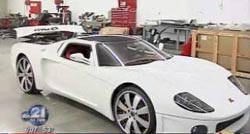The ethanol industry is unanimous in its praise for the actions announced today by the Obama administration with regard to the future development of biofuels under the Renewable Fuels Standard and the creation of a Biofuels Interagency Working Group.
 During a press conference immediately following the announcement, Renewable Fuels Association president Bob Dinneen said, “The president has sent an incredibly important signal today that biofuels are going to be a key component in his strategy to address energy, economic and environmental challenges. This is a positive step forward for the industry.”
During a press conference immediately following the announcement, Renewable Fuels Association president Bob Dinneen said, “The president has sent an incredibly important signal today that biofuels are going to be a key component in his strategy to address energy, economic and environmental challenges. This is a positive step forward for the industry.”
 Growth Energy CEO Tom Buis says the comprehensive plan announced today will decrease dependence on foreign oil, create American jobs and cut greenhouse gas emissions. “America’s ethanol producers stand ready to help the president, and his working group, meet their ambitious goals,” said Buis.
Growth Energy CEO Tom Buis says the comprehensive plan announced today will decrease dependence on foreign oil, create American jobs and cut greenhouse gas emissions. “America’s ethanol producers stand ready to help the president, and his working group, meet their ambitious goals,” said Buis.
 The American Coalition for Ethanol (ACE) Executive Vice President Brian Jennings said they are grateful to President Obama for outlining how biofuels will continue to play an integral role in our nation’s economic and energy security policy. “Importantly, the President’s directive will ensure that science – not politics – determine the future of biofuels, which will surely disappoint opponents of ethanol whose PR campaign has been designed to destroy public policy support for ethanol,” Jennings said.
The American Coalition for Ethanol (ACE) Executive Vice President Brian Jennings said they are grateful to President Obama for outlining how biofuels will continue to play an integral role in our nation’s economic and energy security policy. “Importantly, the President’s directive will ensure that science – not politics – determine the future of biofuels, which will surely disappoint opponents of ethanol whose PR campaign has been designed to destroy public policy support for ethanol,” Jennings said.
All groups were also pleased that EPA committed to further study the controversial theory of indirect land use change before finalizing the greenhouse gas emissions scores for biofuels. Dinneen says “just comparing apples to apples” the direct effects of ethanol production show a better than 60 percent better improvement over petroleum. “Trying to evaluate indirect effects, particularly international indirect effects, is highly dependent on assumptions used and data available and there is a great deal of uncertainty about this,” said Dinneen.
Furthermore, Buis said that indirect land use change as currently proposed doesn’t allow an accurate comparison of fuels because it doesn’t include the indirect effects of other fuels. “To include indirect effects in regulations without even considering the indirect effects of other fuels would unfairly bias those regulations against biofuels,” said Buis.
Jennings said they encourage the Interagency Working Group to require fossil fuels undergo the same lifecycle analysis that has been imposed on biofuels, “an evaluation which will show that future sources of oil are going to have some serious consequences for the environment, while future sources of biofuel are going to be even better and more sustainable than they are already.”


 The U.S. Departments of Agriculture and Energy, together with the Environmental Protection Agency will make up the the new Biofuels Interagency Working Group. “The president has directed us to create a comprehensive biofuel marketing development program to focus on the infrastructure that will be necessary for this industry to be a permanent part of the American economy and to do it in a sustainable way,” said Agriculture Secretary Tom Vilsack during a conference call this morning with EPA administrator Lisa Jackson and Energy Secretary Steven Chu.
The U.S. Departments of Agriculture and Energy, together with the Environmental Protection Agency will make up the the new Biofuels Interagency Working Group. “The president has directed us to create a comprehensive biofuel marketing development program to focus on the infrastructure that will be necessary for this industry to be a permanent part of the American economy and to do it in a sustainable way,” said Agriculture Secretary Tom Vilsack during a conference call this morning with EPA administrator Lisa Jackson and Energy Secretary Steven Chu. “In the 2007 Energy Independence and Security Act (EISA), Congress recognized the need for a homegrown fuel source,” said Jackson. She said EPA is today publishing a standard that establishes four categories of renewable fuels and is soliciting peer reviewed, scientific feedback to ensure that the best science available is utilized prior to implementation.
“In the 2007 Energy Independence and Security Act (EISA), Congress recognized the need for a homegrown fuel source,” said Jackson. She said EPA is today publishing a standard that establishes four categories of renewable fuels and is soliciting peer reviewed, scientific feedback to ensure that the best science available is utilized prior to implementation.  Secretary Chu noted that agriculture is one of the nation’s greatest resources for energy. “We have incredible capacity not only to grow the food we need and to have dynamic exports, we can also grow a considerable amount of energy,” said Chu. He announced that $786 million will be invested through the recovery act for the development of advanced biofuels and the expansion of commercial biorefineries. Chu also said they will be creating an Algae Biofuels Consortium for the development of algae biofuels.
Secretary Chu noted that agriculture is one of the nation’s greatest resources for energy. “We have incredible capacity not only to grow the food we need and to have dynamic exports, we can also grow a considerable amount of energy,” said Chu. He announced that $786 million will be invested through the recovery act for the development of advanced biofuels and the expansion of commercial biorefineries. Chu also said they will be creating an Algae Biofuels Consortium for the development of algae biofuels. The White House will form a working group to be chaired by the heads of three government agencies to speed the sustainable development of biofuels.
The White House will form a working group to be chaired by the heads of three government agencies to speed the sustainable development of biofuels. Biodiesel makers have been extending their feedstocks into the various types of oils, including waste greases and even animal fats. But the problem is converting the free fatty acids in the feedstocks into biodiesel, sometimes a long and costly process. Well, it looks like researchers at Wake Forest University have found a way to do it quicker and cheaper.
Biodiesel makers have been extending their feedstocks into the various types of oils, including waste greases and even animal fats. But the problem is converting the free fatty acids in the feedstocks into biodiesel, sometimes a long and costly process. Well, it looks like researchers at Wake Forest University have found a way to do it quicker and cheaper. A refinery in Louisiana slated to turn chicken fat, along with beef tallow, pork lard and other greases, into high-quality biodiesel and jet fuel by next year.
A refinery in Louisiana slated to turn chicken fat, along with beef tallow, pork lard and other greases, into high-quality biodiesel and jet fuel by next year. The National Biodiesel Board says commercial biodiesel production in the U.S. in March 2009 fell to 30 million gallons… down from 49 million gallons just a year earlier and as low as 2006 levels. In
The National Biodiesel Board says commercial biodiesel production in the U.S. in March 2009 fell to 30 million gallons… down from 49 million gallons just a year earlier and as low as 2006 levels. In  EPA is required under the 2007 Energy Bill to consider ‘significant indirect emissions’ when determining greenhouse gas emissions for fuels under the so-called RFS-2 program. The new RFS requires new corn ethanol plants and new cellulosic ethanol plants to produce a fuel that emits fewer life-cycle greenhouse gasses relative to regular gasoline and that indirect land use changes should be figured into that.
EPA is required under the 2007 Energy Bill to consider ‘significant indirect emissions’ when determining greenhouse gas emissions for fuels under the so-called RFS-2 program. The new RFS requires new corn ethanol plants and new cellulosic ethanol plants to produce a fuel that emits fewer life-cycle greenhouse gasses relative to regular gasoline and that indirect land use changes should be figured into that.  Peter Collorafi and Douglas Pelmear have come up with a plan that they say will revolutionize the automotive Industry. Their V-8 engine Revenge Verde will have an expected 400 horsepower, 500 foot lbs of torque and will run on E85. it also will receive 100-miles per gallon of fuel.
Peter Collorafi and Douglas Pelmear have come up with a plan that they say will revolutionize the automotive Industry. Their V-8 engine Revenge Verde will have an expected 400 horsepower, 500 foot lbs of torque and will run on E85. it also will receive 100-miles per gallon of fuel. The latest state to post an entry is Missouri. The state is turning to alternative energy to replace jobs lost due to economic turmoil that includes an auto industry near collapse. Several months ago, President Obama was in Colorado to sign the economic stimulus package and praise the state for its support of alternative energy.
The latest state to post an entry is Missouri. The state is turning to alternative energy to replace jobs lost due to economic turmoil that includes an auto industry near collapse. Several months ago, President Obama was in Colorado to sign the economic stimulus package and praise the state for its support of alternative energy. While the United States government drags its feet on making a decision to offer American motorists the choice to use E15 at the pump, the Brazilian government is contemplating an ethanol blend increase from E25 to E30. Currently the
While the United States government drags its feet on making a decision to offer American motorists the choice to use E15 at the pump, the Brazilian government is contemplating an ethanol blend increase from E25 to E30. Currently the